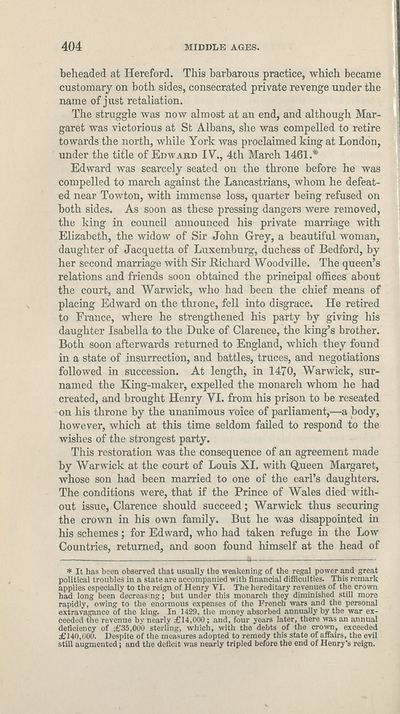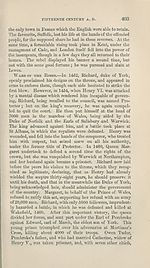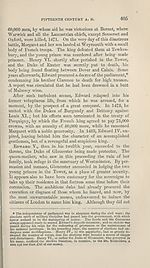Download files
Complete book:
Individual page:
Thumbnail gallery: Grid view | List view

404
MIDDLE AGES.
beheaded at Hereford. This barbarous practice, which became
customary on both sides, consecrated private revenge under the
name of just retaliation.
The struggle was now almost at an end, and although Mar¬
garet was victorious at St Albans, she was compelled to retire
towards the north, while York was proclaimed king at London,
under the title of Edward IV., 4th March 1461.*
Edward was scarcely seated on the throne before he was
compelled to march against the Lancastrians, whom he defeat¬
ed near Towton, with immense loss, quarter being refused on
both sides. As soon as these pressing dangers were removed,
the king in council announced his private marriage with
Elizabeth, the widow of Sir John Grey, a beautiful woman,
daughter of Jacquetta of Luxemburg, duchess of Bedford, by
her second marriage with Sir Richard Woodville. The queen’s
relations and friends soon obtained the principal offices about
the court, and Warwick, who had been the chief means of
placing Edward on the throne, fell into disgrace. He retired
to France, where he strengthened his party by giving his
daughter Isabella to the Duke of Clarence, the king’s brother.
Both soon afterwards returned to England, which they found
in a state of insurrection, and battles, truces, and negotiations
followed in succession. At length, in 1470, Warwick, sur-
named the King-maker, expelled the monarch whom he had
created, and brought Henry VI. from his prison to be reseated
on his throne by the unanimous voice of parliament,—a body,
however, which at this time seldom failed to respond to the
wishes of the strongest party.
This restoration was the consequence of an agreement made
by Warwick at the court of Louis XI. with Queen Margaret,
whose son had been married to one of the earl’s daughters.
The conditions were, that if the Prince of Wales died with¬
out issue, Clarence should succeed; Warwick thus securing
the crown in his own family. But he was disappointed in
his schemes; for Edward, who had taken refuge in the Low
Countries, returned, and soon found himself at the head of
MIDDLE AGES.
beheaded at Hereford. This barbarous practice, which became
customary on both sides, consecrated private revenge under the
name of just retaliation.
The struggle was now almost at an end, and although Mar¬
garet was victorious at St Albans, she was compelled to retire
towards the north, while York was proclaimed king at London,
under the title of Edward IV., 4th March 1461.*
Edward was scarcely seated on the throne before he was
compelled to march against the Lancastrians, whom he defeat¬
ed near Towton, with immense loss, quarter being refused on
both sides. As soon as these pressing dangers were removed,
the king in council announced his private marriage with
Elizabeth, the widow of Sir John Grey, a beautiful woman,
daughter of Jacquetta of Luxemburg, duchess of Bedford, by
her second marriage with Sir Richard Woodville. The queen’s
relations and friends soon obtained the principal offices about
the court, and Warwick, who had been the chief means of
placing Edward on the throne, fell into disgrace. He retired
to France, where he strengthened his party by giving his
daughter Isabella to the Duke of Clarence, the king’s brother.
Both soon afterwards returned to England, which they found
in a state of insurrection, and battles, truces, and negotiations
followed in succession. At length, in 1470, Warwick, sur-
named the King-maker, expelled the monarch whom he had
created, and brought Henry VI. from his prison to be reseated
on his throne by the unanimous voice of parliament,—a body,
however, which at this time seldom failed to respond to the
wishes of the strongest party.
This restoration was the consequence of an agreement made
by Warwick at the court of Louis XI. with Queen Margaret,
whose son had been married to one of the earl’s daughters.
The conditions were, that if the Prince of Wales died with¬
out issue, Clarence should succeed; Warwick thus securing
the crown in his own family. But he was disappointed in
his schemes; for Edward, who had taken refuge in the Low
Countries, returned, and soon found himself at the head of
Set display mode to:
![]() Universal Viewer |
Universal Viewer | ![]() Mirador |
Large image | Transcription
Mirador |
Large image | Transcription
| Antiquarian books of Scotland > Education > Elements of universal history on a new and systematic plan > (424) |
|---|
| Permanent URL | https://digital.nls.uk/127585228 |
|---|
| Description | Thousands of printed books from the Antiquarian Books of Scotland collection which dates from 1641 to the 1980s. The collection consists of 14,800 books which were published in Scotland or have a Scottish connection, e.g. through the author, printer or owner. Subjects covered include sport, education, diseases, adventure, occupations, Jacobites, politics and religion. Among the 29 languages represented are English, Gaelic, Italian, French, Russian and Swedish. |
|---|

